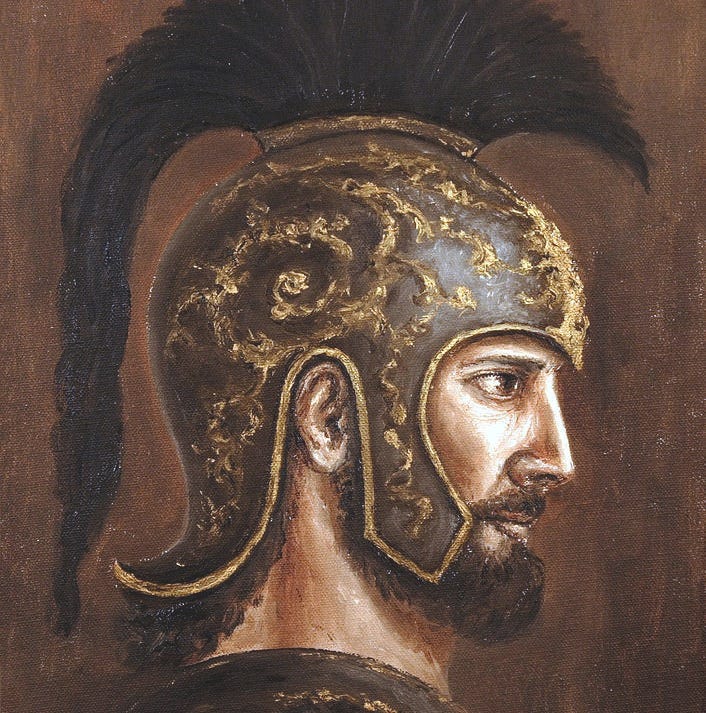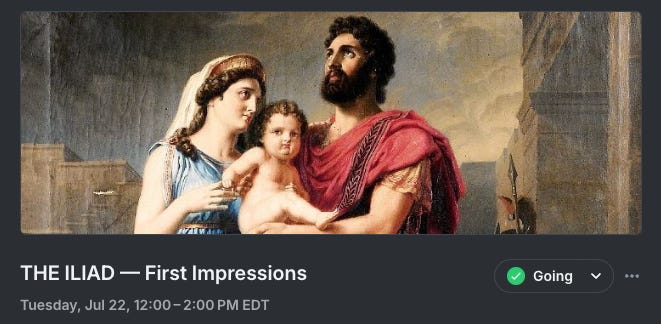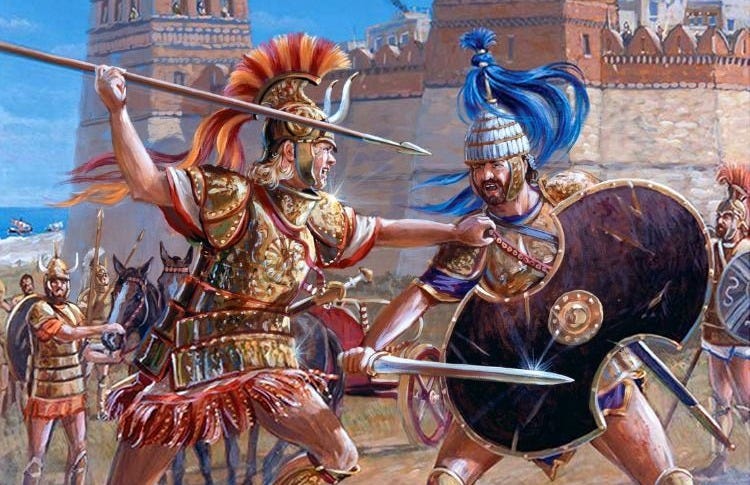The True Hero of The Iliad
Hint: it isn't Achilles...
Outside scripture, Homer’s Iliad boasts the oldest hero in Western literary history.
He was a man so legendary that bards, monks, and royalty venerated his courage for millenia. He was immortalized in the 9 Worthies — considered the 9 greatest heroes to have ever walked this Earth. Yet he’s the hero many first time readers of The Iliad least expect.
Readers often expect Achilles to be the celebrated protagonist of the Iliad. After all, the muses sing of his wrath in the opening lines, and it's his rage that drives the story. Beyond that, he’s the greatest warrior on the battlefield — surely the Greeks would celebrate him as the greatest hero!
Though Homer was indeed a Greek poet, writing for a Greek audience, history revealed that the true hero of the Iliad wasn’t Achilles, Ajax, Diomedes, nor any of the famed warriors of the Greek army. The true hero of The Iliad is none other than Hector, the famed prince of the Trojan army.
Today we’ll dive deep into Hector’s heroic exploits, and the secrets to his character that made him not just a formidable leader, but arguably the greatest model of heroism in all Western Civilization…
Don’t forget to join our FREE book club!
We started a digital book club to study the great texts of Western Civilization — from Dante to Dostoevsky — together. Inside, you’ll get:
Live community book discussions (bi-weekly)
New, deep-dive literature essays every week
The entire archive of book reviews + our 100 great texts reading list
Our first discussion on The Iliad is today at 12pm EST!
Sign up below to attend — all paid members can join the live discussion up on stage…
Note: paid subscribers via Substack will automatically receive an access link for the live calls.
A Long-suffering Leader
At first glance, it’s not obvious why Hector is the noblest warrior of The Iliad.
The chief virtue of The Iliad is arete — the valor and excellence of being a skilled warrior — and there are many Greek warriors stronger than Hector.
What distinguished Hector, however, is not just his warrior ethos alone. To his credit, he’s a skilled warrior in his own right, but Hector’s character is the mark of a morally exemplar great souled man. In a pagan world overrun with the selfish pursuit of glory — fighters seeking to slaughter so their name can be immortalized — Hector’s selfless valor shines as the hallmark of self-sacrificial duty. Let’s examine why.
First off, this war is not Hector’s fault. As a reminder, the Greek army is invading Troy because Hector’s brother, Paris, kidnapped Helen, the wife of Menelaus. In other words, Hector’s city is invaded due to his selfish brother, and he’s cleaning up the mess. Impressively, Hector shows no self-pity. He’s disgusted with his brother’s cowardice and treachery, yet still deigns to lay down his life to protect his wretched kin nonetheless. Yet his selfless deeds go far beyond protecting his own blood.
Perhaps Hector’s brightest moment as a warrior is when he volunteers to duel Ajax the Great. The deal is that the winner of the duel ends the war, meaning if Ajax wins the Trojans surrender, yet if Hector wins the Greeks will go home.
Given that Ajax is a literal giant, and 2nd only to Achilles the demigod in ferocity, Hector’s courage, fortitude, and spirited greatness shine on full display. He proves himself a competent warrior, but more importantly, he was willing to sacrifice his own life to save his city… a city of perhaps ungrateful men who spend more time chastising Hector (like Polydamas), or taking advantage of him (like Paris), than actually supporting him. None of this is of a concern to Hector. He’s the prince of Troy and will defend his people to the death.
Yet Hector’s nobility on the battlefield is nothing like the heart-wrenching conversation with his family.
His discussion with his wife Andromache, as we’re about to see, is one of the most tragic, famous, and heartbreaking lines in all of literature…





